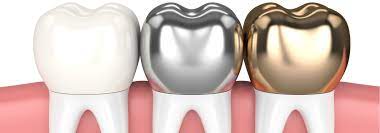Crowns for Teeth: A Complete Guide to Restoring Your Smile
When it comes to restoring damaged or decayed teeth, crowns for teeth are one of the most effective dental solutions available. Whether you have a cracked, weakened, or discolored tooth, a dental crown can provide both functional and aesthetic benefits. At Bender Dental Care, we specialize in high-quality dental restorations, including crowns, to help you achieve a healthy, beautiful smile. If you’re considering this treatment, call us at (847) 888-4333 to schedule a consultation.
What Are Crowns for Teeth?
Dental crowns are custom-made caps that fit over a damaged tooth, restoring its shape, size, strength, and appearance. They are commonly used to:
- Protect weak teeth from further damage
- Restore broken or severely worn teeth
- Cover dental implants or large fillings
- Improve the appearance of discolored or misshapen teeth
Types of Dental Crowns
There are several types of crowns for teeth, each with unique benefits:
1. Porcelain Crowns
- Natural-looking, ideal for front teeth
- Stain-resistant and durable
2. Metal Crowns (Gold or Silver Alloys)
- Extremely strong and long-lasting
- Best for back teeth that endure heavy chewing
3. Porcelain-Fused-to-Metal (PFM) Crowns
- Combines strength with a natural appearance
- Slightly less aesthetic than all-porcelain crowns
4. Zirconia Crowns
- Highly durable and biocompatible
- Excellent for both front and back teeth
Why You Might Need Crowns for Teeth
Common Reasons for Dental Crowns
- Tooth Decay: When a filling isn’t enough, a crown provides extra protection.
- Cracked or Broken Teeth: Crowns hold the tooth together and prevent further damage.
- After Root Canal Treatment: Crowns protect the weakened tooth.
- Cosmetic Enhancement: For severely discolored or misshapen teeth.
Signs You May Need a Crown
- Persistent tooth pain or sensitivity
- Visible cracks or chips
- A large filling that’s failing
- A tooth that’s worn down or weakened
The Process of Getting Crowns for Teeth
Step 1: Consultation & Examination
Your dentist will examine your tooth and determine if a crown is the best solution. X-rays may be taken to assess the tooth’s roots and surrounding bone.
Step 2: Tooth Preparation
The tooth is reshaped to make room for the crown. If the tooth is severely damaged, a filling material may be used to build it up.
Step 3: Impressions & Temporary Crown
An impression of your tooth is sent to a dental lab to create your custom crown. A temporary crown is placed to protect the tooth while you wait.
Step 4: Permanent Crown Placement
Once your crown is ready, your dentist will check the fit, color, and bite before permanently cementing it in place.
How Long Do Crowns for Teeth Last?
With proper care, dental crowns can last 10-15 years or longer. To extend their lifespan:
- Brush and floss daily
- Avoid chewing hard objects (ice, hard candy)
- Visit your dentist regularly for check-ups
FAQs About Crowns for Teeth
1. Does Getting a Crown Hurt?
No, the procedure is performed under local anesthesia, so you shouldn’t feel pain. Some sensitivity is normal afterward.
2. How Much Do Crowns Cost?
The cost varies depending on the material and location of the tooth. Dental insurance often covers part of the cost.
3. Can a Crown Fall Off?
While rare, crowns can loosen or fall off due to decay or trauma. If this happens, contact your dentist immediately.
Conclusion
If you’re looking for a reliable way to restore your damaged teeth, crowns for teeth offer a durable and aesthetically pleasing solution. At Bender Dental Care, we provide top-quality dental crowns tailored to your needs. Call us today at (847) 888-4333 or visit benderdentalcare.com to book your appointment!
